Reshaping the Multiverse:
Li Po's ideas for "Planescape" campaigns
To rid oneself of avarice,
to shun temptation, and to resist corruption
is to attain the most enviable of all titles: An Honest Man.
-- Utadas Tensar, in "A Guide to Sigil"
Sin makes its own hell,
and goodness its own heaven.
Help yourself to my Planescape Character Generator
for MS-DOS.
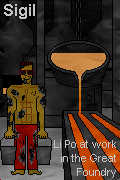 "Planescape" is really about our own world's ideals and
ideologies. By turns light-hearted, cynical, and deeply moving,
it mirrors the minds of our own players. AD&D is especially
popular among teens and young adults who are discovering their
philosophies of life.
"Planescape" is really about our own world's ideals and
ideologies. By turns light-hearted, cynical, and deeply moving,
it mirrors the minds of our own players. AD&D is especially
popular among teens and young adults who are discovering their
philosophies of life.
The "Planescape" campaign promised player characters
would watch their beliefs change the nature of the multiverse.
So far, this has been realized when a portion of one plane shifts
to another because of the philosophic leanings of its
inhabitants.
The imaginary universes of adventure gaming exist for the players. It
seems right that the beliefs of "Planescape" player characters would
have extraordinary power, and
reshape reality more than do the beliefs
of their NPC counterparts. Credible or not, players will like
seeing their beliefs worked out in the world around them.
Here are notes toward a system that allows mature gamers the
opportunity to see their ideologies reshape their world.
In these suggested rules modifications,
Immanuel Kant's categorical imperative becomes the stuff of
personal experience. These optional rules are intended primarily
as a model for other referees whose imagination and ability
exceed my own modest gifts. Regardless of how these ideas are
implemented, referees will find them challenging.
Please E-mail me your own
suggestions for this system. They may find a place, and an
acknowledgment, from Li Po.
Most people in our world profess good alignment and some
metaphysical faith commitment. Yet I once saw a survey in which
members were asked, "How does your religion affect what you do
outside of church?" Many respondents could not reply
without thinking hard, and some could not answer at all. TSR's
products, and "Planescape" in particular, offers an exercise in
which inner beliefs are worked out in the larger world.
It
should be wholesome.
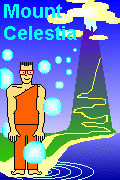 Game mechanics
Game mechanics
At the beginning of each game session, calculate the total
number of player character levels for gamers present.
For multi-class or dual-class, count the highest level,
and one extra for each additional class. Divide these points
among the factions as faction membership points.
As participants enter or leave the game, or if a player
character gains a level, revise these.
Clueless and Outsiders do not
contribute faction membership points.
For example, Ed brings a 5th level cleric who belongs to the
Believers of the Source (5 points), Dave brings a 9th level
ranger who belongs to the Harmonium (9 points), Eric brings
a 5/5 level half-elf fighter-cleric who belongs to the Harmonium
(6 points), and Cindy brings a 6/6 level drow fighter-mage
who belongs to the Transcendent Order (7 points). Membership
points are presently...
Believers of the Source: 5 points
Harmonium: 15 points
Transcendent Order: 7 points
Later in the session, Rob comes in with his 10th level fighter
who belongs to the Free League, and Dave has to leave.
Faction membership points are now...
Believers of the Source: 5 points
Harmonium: 6 points
Transcendent Order: 7 points
Free League: 10 points
Faction membership points affect game mechanics as follows:
ATHAR: This faction recalls our world's outspoken
atheists and agnostics. "Defier" membership
points give the percentage chance that any attempt by a priest
of a particular "power" to cast a spell or use a special supernatural
power will simply fail (and be lost).
BELIEVERS OF THE SOURCE: This faction recalls our world's
sects that teach progress through reincarnation (some Hindus, some Buddhists)
and/or toward
godhood (some Mormons). "Godsmen" membership
points give the percentage chance
that any character (player or NPC) who dies in the course of an
adventure will reincarnate as a level 0 or 1 character, complete
with memories of the previous life, 1d6 turns later. The form,
sex, class, age, and location are up to the referee.
BLEAK CABAL: This faction recalls our world's existentialists
and nihilists. "Bleaker" membership points
give the percentage chance that any
NPC will simply do nothing. For each 5 Bleaker
membership points, there is
a penalty of 1 on saving throws vs. "Emotion - Sadness", "Symbol
of Hopelessness", and the like.
DOOMGUARD: This faction recalls our world's nihilists.
"Sinker" membership points
give a percentage penalty that is applied to all
system shock rolls, and a percentage chance of failure of any
creative, curative, or healing priestly spells, and such
wizardly spells as "major/minor creation" and "fabricate".
For each 5 Doomguard membership points,
there is a penalty of 1 on item saving throws. For each 10
Doomguard membership points, invocations that cause damage
get +1/die.
DUSTMEN: This faction recalls ourworld's stoids. "Dead" membership
points give a percentage penalty that is applied to all
"raise dead" and "resurrection" spells. For each 5
Dead membership points, there is a bonus of 1 on all saves vs. spells
intended to produce any emotion (charm, hope, courage, sadness,
etc.)
FATED: This faction has been noted to recall our world's social
Darwinists and the ideas of Ayn Rand. "Taker" membership
points give a percentage bonus that is applied to all
thieving skills.
FRATERNITY OF ORDER: This faction resembles our philosophers
who emphasize the primacy of science and the value of law.
"Guvnur" membership
points give a percentage bonus on the
chance of success for magical research, and any character's once-in-a-lifetime check for psionic ability. For each 5
Guvnur points, psionic rolls are improved by one.
FREE LEAGUE: This faction recalls our libertarians. "Indep" membership points
give a percentage chance that you'll
be allowed to do your own thing, and business,
racial, or philosophical animosities will not enter into
consideration.
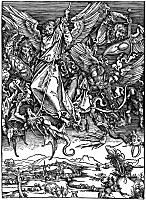 HARMONIUM: This faction recalls our own Religious Right at its
best and worst. "Hardhead" membership
points give a percentage chance that any NPC,
in a particular encounter, will -- automatically
and no-matter-what -- be reasonable, fair, and
decent.
HARMONIUM: This faction recalls our own Religious Right at its
best and worst. "Hardhead" membership
points give a percentage chance that any NPC,
in a particular encounter, will -- automatically
and no-matter-what -- be reasonable, fair, and
decent.
MERCYKILLERS: "Red Death" membership points
give a percentage chance that any PC or NPC who
intends to tell a lie will tell the truth instead.
REVOLUTIONARY LEAGUE: "Anarchist" membership
points give the percentage chance that any particular
authority figure will be indifferent to whatever the party is
doing, by reason of stupidity or personal considerations.
SIGN OF ONE: This faction recalls our New Age "you create your
own reality" mystics. "Signer" membership
points give a percentage chance that a player's
expressed belief is reality. Once per game week per non-Signer player,
twice a week for Signers, a player may say
what he or she thinks
is present or is about to happen. If a d100 roll gives the
percent or less, the belief becomes reality.
The belief must be reasonable, and the
referee may call for or rule out a dice roll.
For example,
Cindy says she thinks the solitary guard is asleep. The referee
has not considered this possibility, but it is reasonable,
and there are 14 Signer points. Cindy is allowed to roll d100,
and rolls 07. The guard is, indeed, sound asleep.
SOCIETY OF SENSATION: This faction has been compared to
the Epicurean philsophy. "Sensate" membership
points give the percentage chance for a PC
asking "Do I notice anything?" to notice something he or she
would otherwise not. Once per game week per non-Sensate player,
twice for Sensates.
TRANSCENDENT ORDER: This faction has been compared to our
intuition mystics (some Taoists, some Zen practitioners, Star Wars jedi).
For each 5 "Cipher" membership
points, there is a
bonus of +1 to everybody's every proficiency check.
XAOSITECTS: This faction recalls our own worlds "discordianism."
"Chaosman" membership points give the percentage chance that a
random effect from the referee's
prepared table happens. Roll whenever
it seems appropriate. Once per adventure, the party can suggest
that something will happen that is possible but unexpected, and
to the party's advantage. A successful
check allows this, and requires immediate referee ingenuity.
For example, a solitary guard might simply decide to join the party
instead of raising the alarm. To offset this advantage, the referee may,
at any time, make a Chaosman membership check to cause a minor
mishap to affect the party.
 Adventure themes
Adventure themes
As a faction gains power from its player-character members,
referees take this into account designing adventures, scenarios,
and NPC's.
Even as one faction comes to dominate the multiverse, the outlook
of the faction can change. Consider a campaign in which the
player-characters are good-aligned and some belong to the Mercykillers.
That faction's pursuit of justice would be as intense, but the
faction becomes just as interested in defending the innocent, and
making sure that punishments are not excessively harsh but
commensurate with the actual danger the crime posed to society.
ATHAR: Scenarios involve reason, not religion. Various
prime worlds go the way of Krynn, and "the gods" disappear, or
the "Birthright" campaign where gods die. Individual "gods"
actually die, or resign, or follow the first
Cat Lord's example and choose to
become mortal. An entire pantheon may
go in search of the greater truth. Clerical NPC's
leave their calling. Bad religions collapse. Churches close.
The planes are enriched with philosophers like Socrates who seek
truth behind the veil and are no longer prosecuted for not believing in the
gods. The petitioners grow restive and question their "powers",
and some of them move on to a mysterious higher destiny.
GOOD PARTIES see the world throw
off the shackles of superstition and enter an age where people
work together in love and without sectarian hatreds.
NON-GOOD PARTIES see the erosion of moral authority along with the
disappearance of organized religion.
BELIEVERS OF THE SOURCE: Scenarios involve people learning
and remembering. Both petitioners and living characters begin
remembering their past lives. "Advanced beings", like avangions,
make their appearances. It is discovered that petitioners
do indeed reincarnate, that no soul is ever annihilated
or confined for too long, and that
they are the origin of the strongly-aligned planar races (devas,
modrons, etc.) The various worlds experience technological
progress. GOOD PARTIES see a world where peace is kept through
good will and example, and people grow in goodness, wisdom, and ability.
NON-GOOD PARTIES see the painful
side-effects of advancing technology, with industrial slavery.
New, more-powerful monsters, some even
resembling "powers" as do the dragons of Athas,
make their appearances.
BLEAK CABAL: Scenarios focus on caring for others in a
meaningless world. Insanity becomes prevalent through the
multiverse, creating many interesting scenarios
for adventurers. People stop looking
for meaning beyond themselves. GOOD PARTIES see a world where people do
good, simply saying "Since life means nothing, why NOT be kind?"
NON-GOOD PARTIES see a world of angst, madness, and despair.
DOOMGUARD: Scenarios involving decay. The trap has been
sprung, the monstrous guardian has died, the treasure has rotted
away. The patron is found dead before the adventurers
earn their reward. Scenarios in collapsed or
collapsing buildings. Worlds like Athas, where magic is
destructive; elsewhere, magic may also begin to have harmful
environmental effects. Worlds that are
already ruined, dying as a result
of pollution or nuclear war or meteor impacts.
Suns within crystal spheres go nova. Petitioners
seem to lose bits of themselves, and memories decay. As
the universe winds down, GOOD
PARTIES discover peace, while NON-GOOD PARTIES find only sadness.
DUSTIES: Scenarios involving the undead in roles
ordinarily filled by ordinary NPC's. Worlds conquered by the
undead. NPC's have a high mortality rate from natural causes.
GOOD PARTIES have a world where both the living and the undead
become logical, reasonable, serene, and dispassionate, and where
equanimity makes possible a life of good works without the
interference of human passion. No one suffers terribly from
emotional hurts, but goes about life with equanimity.
NON-GOOD PARTIES watch both
kindness and humor fade, and finally love and birth themselves
vanish from the world.
FATED: Worlds in which economic activity accelerates to a
frenzy. Capitalism takes over all but the most chaotic planes,
with ruthlessness on the lowers. Government regulations on free
enterprise vanish. People work hard, and work smart. Other people
become robbers. NPC's
continually say, "Stop whining and get a life", "Greed is good".
Sales of self-help books soar. It comes to be known that the
fiends, regardless of type, gain their strength by consuming the
souls of weaker sinners of like alignment and interest, which may
in turn be freed or stolen by killing the fiend. GOOD PARTIES
see unparalleled opportunities for happy corporations, and the
multiverse fills with prosperous world where people live the
adage "Be
nice, it's good for business." Especially, people no longer
cherish personal or ancestral grievances, and never
blame others
for their own lack of initiative. NON-GOOD PARTIES see a Marxian
vision in which greed aggravates the gap between haves and
have-nots without increasing overall productivity, and where the
have-nots often choose to become aggressive thieves.
FRATERNITY OF ORDER: Scenarios in which the underlying
reasons for things become clear. Psionics, based on law, becomes
more prevalent. World governments spring up, for better or
worse. People just start obeying the law, saying "Why not?"
Science is discovered, and research (technological,
scientific) becomes easier, and technology advances.
"We care about how the world works,
not what it means." People say "This is
happening for a valid reason." "Let's make sense out of this."
Science, study, and research become everyone's focus.
If (as in Michael Moorcock's works) "magic" is the power of
chaos, and technology is the power of law, then magic itself may
begin to fade. If (as elsewhere) magic merely reflects an
understanding of the underlying laws of the multiverse, then
magical research, too, becomes easier. GOOD PARTIES see law as developed
and instituted by consent of the governed, promoting the well-
being of communities and protecting the rights and opportunities
of individuals. NON-GOOD PARTIES see new technologies for
oppression, heartlessness masquerading as "scientific objectivism",
and harsh and arbitrary laws.
FREE LEAGUE: Scenarios involving people coming together in
goodwill and dropping their prejudices. Parties adventure to
create a good business climate throughout the multiverse.
Philosophic discussions remain just as frequent but become more
friendly. Instead of faction wars, there are elaborate,
well-reasoned bull sessions. Animosities
among races and religions drop away.
People say, "Don't close your options",
"Nobody really has the eternal truth", "People who pretend to
have all the answers don't let you ask all the questions", etc.
GOOD PARTIES see prosperity increasing, and people who used to
work for ideologies now work to promote the health and happiness
of others. NON-GOOD PARTIES see contempt for intellectuals, and
a focus on selfishness and the unexamined life.
HARMONIUM: NPC's move
in alignment toward law and decency. Large areas of the
multiverse become safe for decent people. It becomes possible and
even commonplace to rehabilitate, rather than kill, most of the
party's enemies. Animosities among races, faiths, and
economic classes vanish.
GOOD PARTIES see people become reasonable,
kind, and fair, and scenarios in which morality
really can be legislated. NON-GOOD
PARTIES see a world dominated by conformist zealots who have
lost sight of love and kindness and who demand obedience on pain
of death.
MERCYKILLERS: Guilty folks confess, and the innocent are
safe from wrongful prosecution. Hostage-taking stops. The law
generally becomes less concerned about killing innocent
bystanders. The dead always go to their just rewards, and
petitioners remember what they have done and how they
are getting their just deserts, for better or worse. It becomes
feasible, in most cases, to apprehend wrongdoers found
adventuring, and taking them back to face justice. Draconian
laws and disproportionate punishments for minor crimes disappear.
But even minor infractions gets noticed, reported, and punished.
GOOD PARTIES see the law become fair, prosecutors become smart,
and wrongdoers becoming contrite and thinking of ways to undo
their wickedness. Restitution and community service becomes more
important than revenge, and rehabilitation occurs. Eventully
there is little law-breaking, simply because people have no reason
to do so. NON-GOOD
PARTIES see wholesale destruction in the pursuit of unwinnable
quests for evildoers.
REVOLUTIONARY LEAGUE: The structures of society
begin collapsing. Authority figures abdicate.
Factories close, armies simply disband, jails are thrown open,
the countryside fills with guerrillas,
and cities become lawless. "Do your own thing." "Live free or die."
GOOD PARTIES see the dreams of the 'sixties revolutionaries
realized in a universe of peace, love, and freedom, where people
provide services and organization because they want to. "If we
make peaceful revolution impossible, we make violent revolution
inevitable." "Work within the system to change the system."
NON-GOOD PARTIES see mob rule, economic collapse, and the
nightmares of the French Revolution.
SIGN OF ONE: The petitioners gain the power to shape their
planes, as described by the spiritualists of our own world.
Illusion-phantasm spells, though they may become easier to recognize,
may become semi-real.
GOOD PARTIES hear ordinary folks say "Improve yourself to improve
the universe." And the pretty things of fantasy worlds
start becoming real, until the world is a happy fairyland.
NON-GOOD PARTIES see people become increasing
isolated and unwilling to communicate with each other.
SOCIETY OF SENSATION: The referee's descriptions become more and more
vivid and sensual, using techniques explained in the
"Ravenloft" campaign materials.
Entertainment centers flourish, and new forms are invented.
Magic items simulate the movies of our world. People on the
street say "Try it! You might like it!" NPC's become
thrill-seekers. The
afterlife grows more sensual. Sensuous heavens and so forth.
People remember to smell the flowers along life's paths. GOOD
PARTIES see a universe of delight and fascination,
ever-increasing opportunities for
exploration. Travel opportunities become easy.
The senses may become more acute, and remain sharp
throughout life.
Petitioners have increased opportunities to vary their
experiences. People learn from their experiences, and are
enriched. And exploration and the frontiers of
experience expands as never before.
NON-GOOD PARTIES see leering sensualists, sexual
exploitation, and new forms of weird cruelty.
TRANSCENDENT ORDER: Scenarios focus on education. Schools open, gym
memberships increase. People from time to time simply vanish.
Mottos are "participate, don't anticipate". GOOD PARTIES see a
world in which even the good clerics say "Hands that help are
better than lips that pray". NON-GOOD PARTIES see the
world fill with amoral, self-centered
martial-arts mystics.
XAOSITECTS: Scenarios involving random effects, random
teleports, descriptions where a dice roll determines outcome.
Dadaist scenarios, things are there that make no sense. Slums
expand, cities decay. There are more random encounter checks.
Wild magic effects pop up, and even psionics has random effects.
Referees create long lists of possible random effects and events.
Language gets more difficult to understand, areas where Babble
occurs. DM and NPC's alter word order. Armies disband.
Battles may become more numerous, but less strategy. Random
changes à la the ship of Lolth, where random events take place
for no reason (for example, goldfish appearing within your
clothes, and turning to glass
when captured.) GOOD PARTIES see creatures
performing random acts of kindness and living lives of
spontaneous beauty. NON-GOOD PARTIES see the multiverse becoming
absurd, science and technology collapsing, and people withdrawing
from fellowship with each others as things become
incomprehensible.
In addition to the factions of Sigil, there are sects based away
from the city. These include
Anarchs' Guild (Chaos Masters, Groundsfolk), who create objects from the
stuff of chaos, an ability that might become possible elsewhere
in the multiverse;
Chameleons (Turncoats), who believe that as we learn, our
beliefs are likely to change, an outlook that would make for
interesting gaming when party members like to talk philosophy
with NPC's;
Dispossessed (Exiles, Chippers), super-tough people who have been banned
from their homes by the law, and who live and work together for
revenge;
Guardians (Protectors, Caretakers) who protect goodness
and fight evil aggressively, seeking to create a safe multiverse
for decent creatures, without concern for Law or Chaos, politics or
anarchy;
Incantifiers, wizards who find meaning in
accumulating magic, and who have escaped old age and death by
consuming it.
Mathematicians, who focus on the mathematical
basis of portal research, and perhaps other great secrets;
Verdant Guild (Wylders), who seek to preserve and extend the natural
wildernesses;
Merkhants (Misers), who unashamedly consider monetary wealth to be the
goal of life, and its accumulation the only meaningful way to
live;
Order of Planes-Militant (Children of Heaven, Faithful), clean-living folks who
defend against evil, and who seek to bring justice, fairness, and
kindness to the rest of the multiverse by example rather than
force;
Ring-Givers (Bargainers, Beggars), for whom a lifestyle of generosity
and poverty is the way to be free of the world's traps, an
attitude that could extend throughout the multiverse;
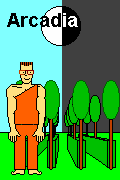 Why this page?
Why this page?
Athar: So that "Planescape" campaigns would focus on
something worthwhile, not
"the gods" and such stupid stuff.
Believers of the Source: Because any gaming system is developing and
evolving toward something stronger, more meaningful, and more enjoyable.
Bleak Cabal: (Sigh)... Don't try to figure out "why", berk.
Doomguard: Because the author, a pathologist, is
constantly confronted with
inevitable wearing-out of the human body.
Dustmen: Because the author wanted to take time
off from examining the dead.
Fated: Because the author seized the opportunity to make a difference.
Fraternity of Order: Because games without rules aren't fun,
and rules should be reasonable.
Free League: To give a hearing to all points of view.
Harmonium: Because most people want to be good and decent, and
be able to live in harmony with others.
Mercykillers: Because the author's special interest in criminal
justice prompted him to think about important things.
Revolutionary league: To work within the system, respecting the
decent rights of others, in order to change the system.
Sign of One: You create your own reality, cutter.
Society of Sensation: To make ideas real, palpable, vivid, so-real-you-can-touch-them.
Transcendent Order: Knew how, did it.
Xaositects: ...rules New chaos generate....
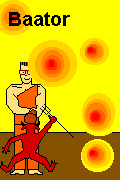 I am glad that you, too, like TSR's wonderful "Planescape"
milieu. Here are some other sites that I hope you enjoy
as much as I have:
I am glad that you, too, like TSR's wonderful "Planescape"
milieu. Here are some other sites that I hope you enjoy
as much as I have:
Jon's Planescape
Site Out of this world!
Planewalker, the most active Planescape site, is back up! Todd Stewart,
the developer, is my cyberfriend. Thanks!
On the
Wings of Mephits -- mostly humor
Wikipedia Planescape
Wikipedia Outer Planes
The Roaming
Genasi Tavern -- "for those touched by the inner planes
AD&D and the Religious Right
Li Po's Hermitage
My
AD&D site, with character generators, a list of individuals
available as consultants, a collection of AD&D links,
a Planescape section, and a review of the pseudo-Christian
attacks on the D&D games;
Li Po's Guide to
the Outer Planes
Silly pictures, etc.
Li Po's Guide to
the Inner Planes Silly pictures, the Temple of
Elemental Goodness, etc.
 Ed's "Hamlet" Site --
Shakespeare
Ed's "Hamlet" Site --
Shakespeare
Athar: "Hamlet" is post-Christian.
Bleakers: Sigh. Hamlet didn't find meaning, because
there isn't any, but he did find peace.
Ciphers: Hamlet found out he could act instead of brood.
Doomguard: The court goes bad and everybody dies.
Dust Folk: Hamlet finds peace in death.
Free League: There are many meanings here.
Godsfolk: Hamlet develops as a person.
Guvnurs: Nowadays with good forensic pathology, we could
have proved the case against Claudius without Hamlet
having to take the law into his own hands.
Hardheads: See what happens when law and order break down.
Mercykillers: We love a good revenge play.
Revolutionaries: Authority corrupts.
Sensates: "Hamlet" showcases powerful feelings.
Signers: There is nothing either good or bad but thinking makes it so.
Takers: Hamlet learned to quit moping and got what he wanted.
Xaositects: Crazy make sense people the most.
You can E-mail me
to obtain the current
test version of the Skills and Powers (which includes Planescape)
character generator, or the smaller Planescape character
generator.
"Planescape", "AD&D", and so forth
are copyright by TSR Hobbies [now Wizards of the Coast].
Without respect for copyright, none of us would be able to enjoy
their creations. It would be a sadder, duller world.
I'm a professional man and a gentleman.
I urge everyone to respect the rights of TSR, now and always.

Panhistoria --Online campaigns by Chayla Hamilton
Planescape Rules were
developed by Wojciech Kozlowski for third edition. I think this is substantially
better than the third edition "Manual of the Planes." The link is now down.
Mimir.net -- remarkable Planescape site
Tony DiTerlizzi's Art
|
|
New visitors to www.pathguy.com
reset Jan. 30, 2005: |
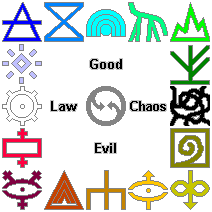 The Alignment Planes
The Alignment Planes
The Abyss -- Chaotic Evil
Acheron -- Lawful, Evil Tendencies
Arborea -- Chaotic Good
Arcadia -- Lawful, Good Tendencies
Baator -- Lawful Evil
The Beastlands -- Good, Chaotic Tendencies
Bytopia -- Good, Lawful Tendencies
Carceri -- Evil, Chaotic Tendencies
Elysium -- Neutral Good
Gehenna -- Evil, Lawful Tendencies
The Gray Waste -- Neutral Evil
Limbo -- Chaotic Neutral
Mechanus -- Lawful Neutral
Mount Celestia -- Lawful Good
The Outlands -- True Neutral
Pandemonium -- Chaotic, Evil Tendencies
Ysgard -- Chaotic, Good Tendencies
The Inner Planes
What "Planescape" could be
AD&D and the Religious Right
Li Po's Hermitage (character generators, more)
Ed's character generators:
![[Do Justice, Love Mercy, Walk Humbly]](holywar.gif)
 Ed's home page
Ed's home page
Autopsy




Ed says, "This world would be a sorry place if
people like me who call ourselves Christians
didn't try to act as good as
other
good people."
 "Planescape" is really about our own world's ideals and
ideologies. By turns light-hearted, cynical, and deeply moving,
it mirrors the minds of our own players. AD&D is especially
popular among teens and young adults who are discovering their
philosophies of life.
"Planescape" is really about our own world's ideals and
ideologies. By turns light-hearted, cynical, and deeply moving,
it mirrors the minds of our own players. AD&D is especially
popular among teens and young adults who are discovering their
philosophies of life. Game mechanics
Game mechanics
 Adventure themes
Adventure themes Why this page?
Why this page? I am glad that you, too, like TSR's wonderful "Planescape"
milieu. Here are some other sites that I hope you enjoy
as much as I have:
I am glad that you, too, like TSR's wonderful "Planescape"
milieu. Here are some other sites that I hope you enjoy
as much as I have: Ed's "Hamlet" Site
Ed's "Hamlet" Site

![[Do Justice, Love Mercy, Walk Humbly]](holywar.gif)


